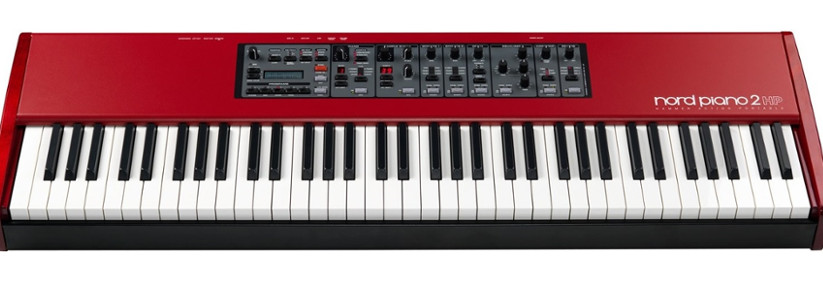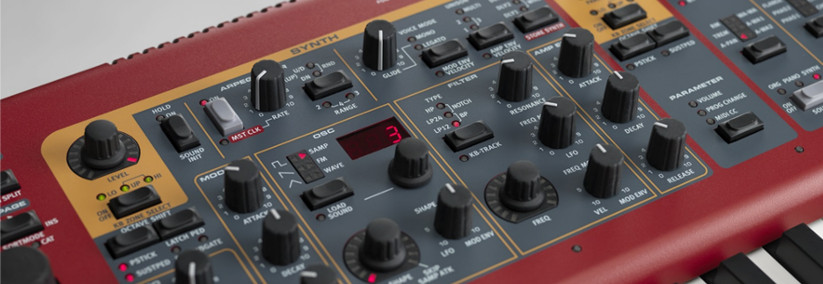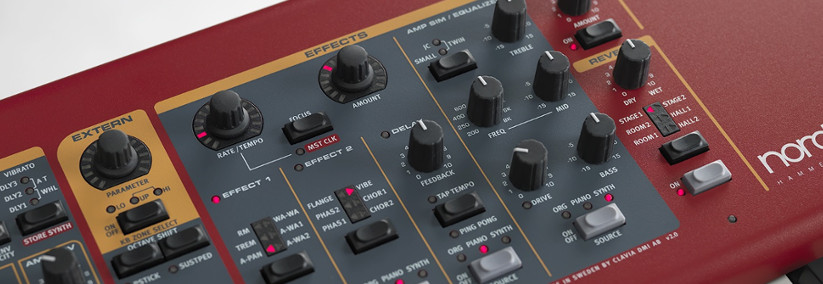How to choose a digital stage piano

TIPS FOR BEGINNERS:
Call 169 941 99 (Mon-Fri 9:00 a.m. - 4:00 p.m.) and our experts will be happy to help you with your selection of a digital piano; you can also send us your questions by email toA quality keyboard is essential
Stage pianos are intended for live performances, but also serve well in the studio and for practicing at home. A full, dynamic keyboard (88 keys) that responds to the intensity of force is of primary importance. Additional functions of dynamic playing on individual keys differ from model to model, with some offering ‘after-touch’, i.e. the possibility to influence the modulation of the played tones by releasing and re-hitting the keys, as with an organ.
Versatile keyboard, organ, synthesiser, or all-in-one
The category of stage pianos is very broad and includes very universal Yamaha digital pianos which, in addition to a rich palette of sounds and effects, also have quick functions for switching registers for improved live playing, up to the elite Nord Stage piano or the uncompromising Roland Piano V, which allows you to build a virtually custom instrument.At the core of all stage pianos is a sound processor containing the quality simulation of a piano or organ, to which are often added the sounds of strings, voices, guitars, drums as well as various other exotic sounds and effects. Stage pianos are designed for playing live, and for this purpose they feature clear screens and numerous buttons for quickly achieving the necessary choice such as changing the backing to refrain or verse, switching the sound of the split keyboard or the very practical accelerated reading of a classical piano. It all depends entirely on your preferences and needs – if you are satisfied with recorded sounds, you can use two modes (piano/organ) with the possibility to edit, or if, in addition to basic presets, you also need complete musical synthesis while on stage. In the category of stage piano, there is a clear answer to all of these requirements.

Accompaniment, backing and split registers
If one of your criteria in choosing an instrument is universality, a stage piano is just what you’re looking for. Even less-expensive stage piano models often feature a memory for new compositions, backing and accompaniments, while also offering complete compositions, be they specific well-known songs or general styles. While the number of offered backing tracks, rhythms and accompaniments differ according to the type of keyboard, in general they range from dozens up to several hundred. Some instruments also features control elements for the volume of individual tracks, making it possible while you’re playing with a backing to boost the volume of the drums and lower, say, the brass section.Each stage piano also offers you the possibility to assign various registers, e.g. to a split keyboard (split function) or to a single tone (dual or layer function). Many instruments provide you the possibility of automatic accompaniment to your played melodies, advanced arrangement interfaces to simplify the process of composing, numerous user buttons or the possibility to program keys to trigger backing tracks or effects. With a good digital piano it is simply desirable to prepare your entire set and to play it without unnecessary searching through registers and presets.
Effects, simulation and advanced work with sound
Many stage pianos offer a wide range of effects, from basic choices such as delay, reverb, pitch shift up to sophisticated simulation of rotating Leslie speakers and vintage amplifiers such as with Nord Stage models. While it is often possible to change the parameters of effects, only higher-end digital piano models allow you to edit their settings while you play using control knobs or macro buttons. With less expensive models, effects must be set in advance and while playing you can only switch them on or off. In addition to preset sounds that can be edited to a greater or lesser extent, some stage pianos also have a unit for the synthesis of new sounds, making them full-fledged synthesisers, as is the case with some stage pianos from Nord, one of the most popular instruments for concert pianists. The control panels of these pianos have extra control elements for individual filters and oscillators.
Connections and peripherals
Based on the scope of features of individual models, it is again possible to divide the connectivity of stage pianos into those with a digital and analogue/digital interface cable of sending, for example, a trigger signal to analogue synthesisers. The digital interface is typically USB and serves both for the transmission of data from the instrument (song sketches, user settings and entire compositions) and to the instrument (new sounds or compositions from the manufacturer, your own songs). The majority of digital pianos have no problem functioning as a MIDI controller for your musical software, and some models also include editing programs that allow you to easily modify the instrument’s individual sounds.Stage pianos typically have jacks for headphones and at least a 6.3 mm TRS jack for connecting to sound equipment or combo amps. They also usually have an AUX jack for connecting external musical sources with backing tracks or other sounds, and it is not unusual for stage pianos to have a microphone jack, which allows you to create voice effects with a vocoder. There are even models that work with iPads and similar electronics to read notes or change piano settings, with the iPad serving as the control panel and screen. The keyboards of new Roland models even work seamlessly with the Garage Band application.




